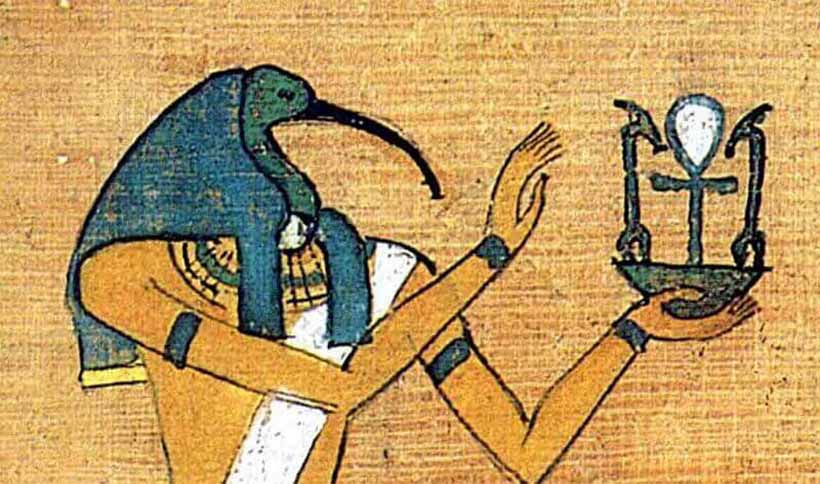Book of Thoth Secrets
The Ibis Headed Egyptian God

Ancient Egypt tradition considers Thoth as the inventor of writing and the guardian of the secrets of celestial movements. It attributes several names to him, the most famous of which is "Thoth, Thrice Great", hence the name of the Greek god Hermes Trismegistus. Son of Ra, of whom he is also the counselor, he is the god of the Moon, of Knowledge, of Scripture, of Magic, of Time Measurement, Mathematics and Geometry. The Egyptians represent it with an ibis head, whose beak evokes a crescent moon, and attribute to it the invention of the calendar which divides the year into three hundred and sixty-five days. The mystery that surrounds Thoth mainly concerns the books he has written and hidden.
Book of Thoth secrets
Where are the books of Thoth hidden ? What do they contain ? According to the Pyramid Texts, the ibis headed egyptian god Thoth would have recorded the celestial mysteries in a number of sacred books. He would then have hidden them so that only the most worthy of future generations could find them.
Today, while some claim that these books are in a secret room under the Great Sphinx, research using the latest technology - under and around the monument - has yet to reveal underground crypts. Other hypotheses however support that these famous texts would be in front of our eyes since always. The complex formed by the pyramids of Giza and the Sphinx is indeed a kind of "terrestrial" retranscription of a precise astronomical arrangement, calculable taking into account the precession of the equinoxes.
The precession of the equinoxes reflects the change in orientation of the earth's axis (a bit like a spinning top) with respect to the celestial sphere. It is a rotation so slow that it takes 26 000 years to the axis of the Earth to make a complete turn, knowing that in this lapse of time the position of the stars changes on the celestial sphere, then to return to the point of departure.
Predicting disasters ?
The intention of the elders would have been to transmit to posterity the manner of calculating the end of each precession cycle, because tradition has it that this period is accompanied by catastrophes on a planetary scale. That's why they built buildings that were big enough to withstand the biggest cataclysms. The mathematical proportions and astronomical alignments of these monuments would therefore contain a message intended to be transmitted beyond the millennia.
Anyway, for now, the Book of Thoth secrets seems destined to remain whole because, formerly, the knowledge was transmitted only orally.
Testimony of another time
Among the texts that evoke the Books of Thoth, the most explicit passage is that of Plato's Phaedrus. In a dialogue with King Tamos, Thoth praises the invention of writing where he sees a tremendous progress for the human species. To which the king replies that the consequence of writing will be to render the mind of the man lazy, by diminishing his intellectual faculties.
Prime Time
The Westcar Papyrus preserved in the Berlin Museum is the oldest document evoking the existence of a secret chamber located in the Giza Necropolis. According to some experts, this room would contain the Books of Thoth.
The Coffin Texts, on the other hand, evokes "something" that contains the emanations of Osiris, "something" that would be sealed in the dark and surrounded by fire. In recent years, scholars have proposed a new hypothesis according to which the Books of Thoth would in fact be the Atlantis Archives, since the Egyptians would be the survivors of this legendary island, arrived in Egypt at Prime Time.
But beyond the large number of hypotheses already formulated - sometimes fanciful, it must be recognized - Egypt probably reserves many revelations ...
The ibis headed egyptian god
The god Thoth is represented by an ibis or a man with an ibis head. As a judge, he presided over the ceremonies by weighing the souls of the dead in the Duat.









































































































































































































































































































































